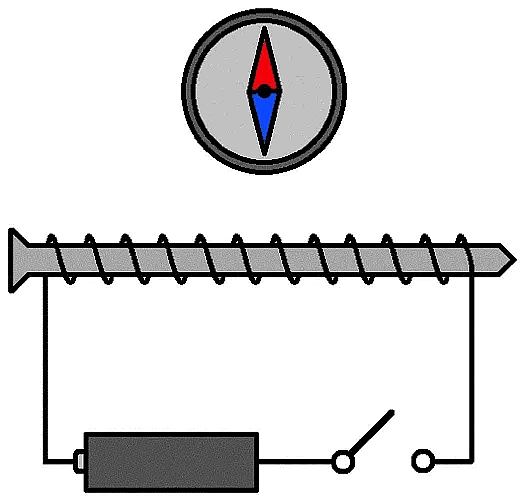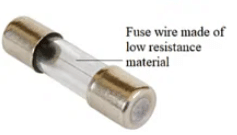NCERT Solutions for Class 7 Science - Electric Current and its Effects
Q1. Draw in your notebook the symbols to represent the following components of electrical circuits: connecting wires, switch in the ‘OFF’ position, bulb, cell, switch in the ‘ON’ position, and battery.
Ans:
Component of electrical circuit | Symbol |
Connecting wires |  |
Switch in the ‘OFF’ position |  |
Bulb |  |
Cell |  |
Switch in the ‘ON’ position |  |
Battery |  |
Q2. Draw the circuit diagram to represent the circuit shown in figure.
 Circuit Diagram
Circuit Diagram
Ans: In the given circuit, one terminal of the bulb is connected with one terminal of the cell while the other terminals are connected to a safety pin. However, the safety pin is not connected to one of the drawing pins. Thus, the circuit is not complete. Hence, the safety pin represents a switch in the ‘OFF’ position.
Therefore, the circuit diagram of the given figure is shown can be represented as
 Circuit is not complete
Circuit is not complete
Q3. Figure shows four cells fixed on a board. Draw lines to indicate how you will connect their terminals with wires to make a battery of four cells.
 Four Cell fixed on a board
Four Cell fixed on a board
Ans: To make a battery, the negative terminal of one cell must be connected to the positive terminal of the next cell. In the above diagram, the upper terminal of the first cell is Positive and the lower terminal is negative.
Therefore, the cells can be connected as shown in the figure below. Here, the wire indicates the manner in which the given cells should be connected with each other.
 Cells are connected with wires
Cells are connected with wires
Q4. The bulb in the circuit shown in Figure does not glow. Can you identify the problem? Make necessary changes in the circuit to make the bulb glow.
 Bulb in the circuit
Bulb in the circuit
Ans:
- The bulb in the circuit is not glowing because the two cells are not connected properly, here the positive termoinal of one cell is connected to the positive terminal of the other cell
- To make the bulb glow, the negative terminal of one cell should be connected to the positive terminal of the other cell, as shown in the given figure.
 Negative Terminal connected to Positive Terminal
Negative Terminal connected to Positive Terminal
Q5. Name any two effects of electric current.
Ans: The two effects of electric current are:
(i) Heating effect of electric current: When electric current flows through a wire or any conductor, it can produce heat. You might have experienced this when using an electric heater or stove. The electric energy is transformed into heat energy, making things hot.
(ii) Magnetic effect of electric current: Electric current also has the ability to create a magnetic field around the path it takes. This effect is used in many things we encounter in everyday life. For example, electromagnets use electric current to generate a magnetic field, which can be used to pick up objects made of iron or steel. Electric motors also rely on the interaction between electric current and magnetic fields to create movement and make things work.
Q6. When the current is switched on through a wire, a compass needle kept nearby gets deflected from its north-south position. Explain.
Ans: When a current is switched on through a wire, the wire starts behaving as a magnet. Hence, when a compass needle is placed near the given current carrying wire, it gets influenced by the magnetic effect of electric current and gets deflected from its North-South position.
 When the switch is closed the compass needle shows deflection
When the switch is closed the compass needle shows deflection
Q7. Will the compass needle show deflection when the switch in the circuit shown by figure is closed?

Ans: No, The given circuit does not have any current source. In the absence of current, the wire does not behave as a magnet and hence, the compass needle will not show any deflection.
Q8. Fill in the blanks:
(a) Longer line in the symbol for cell represents its____terminal.
(b) The combination of two or more cells is called a ____.
(c) When current is switched ‘on’ in a room heater, it ____.
(d) The safety device based on the heating effect of electric current is called a ___.
Ans:
(a) Longer line in the symbol for cell represents its positive terminal.

(b) The combination of two or more cells is called a battery.
Cells can be combined to form a Battery Combined BatteryTo make a battery, the negative terminal of one cell is connected to the positive terminal of the next cell and so on.
Combined BatteryTo make a battery, the negative terminal of one cell is connected to the positive terminal of the next cell and so on.
(c) When current is switched ‘on’ in a room heater, it produces heat.
The working of a room heater is based on the phenomenon of heating effect of electric current.
 Heater shows the heating effect of electric current(d) The safety device based on the heating effect of electric current is called a fuse.
Heater shows the heating effect of electric current(d) The safety device based on the heating effect of electric current is called a fuse.

- When the current exceeds its limit the fuse wire shown in the figure melts
- Fuse is a safety device, which limits the current in circuit and breaks the circuit if the current exceeds its maximum limit.
Q9. Mark ‘T’ if the statement is true and ‘F’ if it is false:
(a) To make a battery of two cells, the negative terminal of one cell is connected to the negative terminal of the other cell. (T/F)
(b) When the electric current through the fuse exceeds a certain limit, the fuse wire melts and breaks. (T/F)
(c) An electromagnet does not attract a piece of iron. (T/F)
(d) An electric bell has an electromagnet. (T/F)
Ans:
(a) False, To make a battery of two cells, the negative terminal of one cell must be connected to the positive terminal of the other cell.
(b) True, The wire of the fuse is made of special material which has a low melting point. When large current passes through a fuse, it melts quickly and breaks the circuit.
 Fusing element shown in figure is a special wire with low melting point
Fusing element shown in figure is a special wire with low melting point
(c) False, Working of an electromagnet is based on the magnetic effect of electric current. An electromagnet behaves as a magnet when current passes through it. Hence, it will attract a piece of iron.
(d) True, An electric bell has a piece of iron wound by a coil. When current passes through this coil, it behaves as an electromagnet.
 Electric Bell
Electric Bell
Q10. Do you think an electromagnet can be used for separating plastic bags from a garbage heap? Explain.
Ans: No.
Electromagnets can only attract magnetic materials. Plastic bag is a non-magnetic material and will not be attracted by an electromagnet. Hence, an electromagnet cannot be used for separating plastic bags from a garbage heap.
Q11. An electrician is carrying out some repairs in your house. He wants to replace a fuse by a piece of wire. Would you agree? Give reasons for your response.
Ans: No.
The electrician cannot be allowed to replace the fuse in the house by a piece of wire. This is because every wire cannot be used as a fuse filament. A fuse filament must have a low melting point such that it could melt and break in response of large amount of current. Most of the wires have high melting points.
Q12. Zubeda made an electric circuit using a cell holder shown in Fig. a switch and a bulb. When she put the switch in the ‘ON’ position, the bulb did not glow. Help Zubeda in identifying the possible defects in the circuit.
 Cell HolderAns: The reasons may be as follows:
Cell HolderAns: The reasons may be as follows:
- The connecting wire may be loose
- The electric cell may be used up
- Switch may not be functioning well
- Cell power has been exhausted
Q13. In the circuit shown in figure

(i) Would any of the bulbs glow when the switch is in the ‘OFF’ position?
(ii) What will be the order in which the bulbs A, B and C will glow when the switch is moved to the ‘ON’ position?
Ans:
(i) No.
When the switch is in the ‘OFF’ position, the current does not flow through the circuit. Hence, none of the bulbs will glow.
(ii) Bulbs will glow simultaneously.
When the switch is moved to the ‘ON’ position, then all the bulbs will glow at once. This is because they all are connected to the same battery and switch.
|
111 videos|246 docs|28 tests
|

|
Explore Courses for Class 7 exam
|

|


















